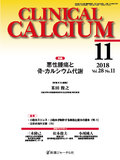Japanese
English
- 有料閲覧
- Abstract 文献概要
- 1ページ目 Look Inside
- 参考文献 Reference
ビタミンD欠乏と大腸がんとの関連性,及び活性型ビタミンDである1α,25-ジヒドロキシビタミンD3[1,25(OH)2D3]による急性骨髄性白血病細胞株の分化誘導効果といった知見から,ビタミンDの抗腫瘍効果が注目され,多くの研究がなされてきた。1,25(OH)2D3は,核内受容体であるビタミンD受容体(VDR)を活性化することで,細胞の増殖抑制や分化を誘導する。VDRの活性化は,炎症や血管新生を抑制することでも抗腫瘍効果を及ぼす。また,VDRによる二次胆汁酸の代謝促進作用も,大腸がんの発症抑制に関与するかも知れない。大腸がん,乳がん,前立腺がん,骨髄性白血病など多くの悪性腫瘍において1,25(OH)2D3や誘導体の抗腫瘍効果が報告されているが,高カルシウム血症を誘導しない化合物の開発が課題である。
Vitamin D deficiency and insufficiency are associated with an increased risk of colon cancer. The active form of vitamin D, 1α,25-dihydroxyvitamin D3[1,25(OH)2D3], inhibits proliferation and/or induces differentiation in cells derived from myeloid leukemia, colon cancer, breast cancer, prostate cancer and other malignancies. 1,25(OH)2D3 and its synthetic derivatives activate vitamin D receptor(VDR), a member of the nuclear receptor superfamily, and exhibit antitumor effects by regulating genes involved in cell cycle, differentiation, apoptosis, inflammation and angiogenesis. VDR activation also enhances metabolism of toxic bile acids, likely preventing colon carcinogenesis. Although many cell culture and animal experiments show that VDR is a promising drug target in the treatment of malignancy and many VDR ligands have been developed, a principal adverse effect of hypercalcemia has limited their clinical application. The development of VDR ligands with less calcemic activity is needed to expand clinical application of VDR-targeting therapy.



